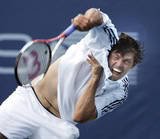The never-ending influence
People influence each other to varying degrees. We know that the political machinations of groups cause us to listen to some, and not listen to others. We won't ever really just ignore everyone.
Frequently the biggest influence on a young person is the father or mother. Through their care and attention, other people simply do not feature strongly enough to compete with parents. Most of the early formative years are a purely parental work, initially the mother, but more and more the father as time progresses.

Mother, then father
What happens if the parents have an influence on general behaviour, but in fact don't deliver specific peer group behaviours, or information relative to a hobby or ambition like tennis.
Then these external influences may start to take over, often to the great consternation of the parents. Quite normally, when you exercise an influence that pleases you, you hate to see it wane or disappear.They may become most jealous of these new influences. They may even see dangers, like a complete loss of integration, or career control.
I'm a man in his fifties whose father died when I was 33, and for various reasons, schooling, father's job, family situation, I didn't have that much contact to my father. My mother, or various teachers, were potentially much more important figures.
So there is another curiosity, the relative influence of a person on your life doesn't bear any real relation to the amount of exposure you get to that person. It's really about WHAT that person does for you, IN WHICH WAY, and TO WHAT EXTENT. What my father achieved was to create a copiable pleasing model, that I spent many hours unconsciously perfecting. In this respect, mothers in the long run, influence their daughters more, and fathers their sons.
Still, at the age of 53, my father's work of so many years ago is still being exercised. That is the role of a parent, don't you think?
But I do have to say that other people have come into the picture in less profound ways. I must confess that I haven't met many tennis coaches who have guided me . There I have spent most of my time copying stars on the TV, their technique, their mannerisms, their lifestyles.The most important coach I have met was my instructor on the USPTR exam who was an expert communicator, who even managed to do his trick in a four day course where he had no special interest in me, just in transmitting a general message. I quickly understood this general message and have trusted it to this day.
Other teachers I had at school were similar. I was just one of many pupils, but often in subtle ways teachers were able to let their ideas and styles rub off. I obviously took what I liked, and rejected all else.
So my sporting instincts are those of my father, let's say 80%, but anything technical would not be from him. I was too young to understand anything technical from him. And he wasn't a technical man - he was more about attitude and demeanour. Also very useful.
I then became a working man, and I dragged my out of work passions into the workplace. But I learnt all of my work skills from five minutes with a manager there, ten minutes with a client there, and five minutes with a colleague there. This is also probably an 80% job - at work, I'm 80% just myself, 20% bits and pieces of others.

Committed influence
And that would seem to be the end of it, except I must mention one other person, let's call him Will. I met Will when I was in my early forties and I schemed and dealed with him for several years. We were a chalk and cheese mix that infuriated our environment, but earned us lots of respect too. The thing I learned most of him was an aggressive directness that was almost totally absent in my family. He turned me into much more of a go-getter. It's been ten years since I've seen him, but I can feel that invigorating period of my life as if it were yesterday.
Five of our most popular pages
. tournament win
. finding a sponsor
. the touring pro
. the master at work
